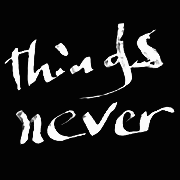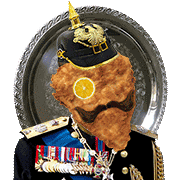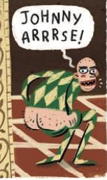|
He's not as much of an overt POS in the later books, if that's any consolation. I did really enjoy the descriptions of the Afghan landscape. Read the first book about a year before I got there and it seemed pretty spot on.
|
|
|
|

|
| # ? Apr 20, 2024 02:35 |
|
The Rat posted:He's not as much of an overt POS in the later books, if that's any consolation. I mean, I'm reading Flash for Freedom right now, and he's literally loading people onto the slave-ship.
|
|
|
|
Yeah I phrased it too quickly when I was phone posting earlier. When I say less of an overt piece of poo poo in the later books, I don't mean that he's any less of an immoral turd. It's more that a lot of the time, it's less an example of Flashman being a standout piece of poo poo like when he rapes Nareeman later in book one, and more to illustrate an example of how lovely the common level of morality was at the time. Like your example of the slave ship, or his later work as a 'driver' in that book, it's an abhorrent act and his attitude is abhorrent, but his attitude is not so different from the people around him. Kind of the author's way of spotlighting the seedier sides of history that the other books in the genre, Kipling and the like, don't show. I'm not very eloquent, but hopefully you understand what I'm getting at. Flashman as a narrative spotlight for the lovely side of British imperialism and the like.
|
|
|
|
That's fair. I guess the biggest difference between Flash and many of the upstanding, respectable people around him is his mindset, not his actions.
|
|
|
|
Yeah, basically. Although the one good thing is that he tends to also spotlight the hypocrisy of those around him who are engaged in the same activities as well, despite moralizing about it.
|
|
|
The Rat posted:Yeah, basically. Although the one good thing is that he tends to also spotlight the hypocrisy of those around him who are engaged in the same activities as well, despite moralizing about it. He can do horrible things because he's intrinsically horrible, normal people construct an elaborate series of lies called society lmao
|
|
|
|
The Rat posted:Yeah, basically. Although the one good thing is that he tends to also spotlight the hypocrisy of those around him who are engaged in the same activities as well, despite moralizing about it. I think this is it. George McDonald Fraser knows that all the substructure supporting Victorian society is horrible, so Flashman does too. Flashman just doesn’t care, except on the occasions where something happens to make him. In the interests of accuracy, though, he definitely became more conservative as he grew older and ended up disclaiming the left wing interpretation of his books: his obituary in the Guardian notes that he “became a right wing figure” who “liked the Empire, a force for good in the world”. [Deleted misattribution of the obituary to the Torygraph. If the Guardian - the closest thing to a left wing paper in the UK - reckons Fraser ended up a full-blown reactionary, they’re probably right.] It remains a fact, though, that the books do showcase the exploitative nature of the Empire in a way few adventure stories do. I should do a proper effortpost on this later; in the meantime I’m still working on one explaining the British India situation at the time of the novel. Beefeater1980 fucked around with this message at 08:42 on Aug 1, 2019 |
|
|
|
|
This kind of reads like its Aubery/Marturin but instead of two buds on the high seas doing stuff, they're fused together into a womanizing sociopath but lost the sense of duty somewhere
|
|
|
|
The Rat posted:Yeah I phrased it too quickly when I was phone posting earlier. When I say less of an overt piece of poo poo in the later books, I don't mean that he's any less of an immoral turd. It's more that a lot of the time, it's less an example of Flashman being a standout piece of poo poo like when he rapes Nareeman later in book one Um. It's not called out as explicitly as Nareeman was but wait til you read about what he does to one of the women on that slave ship.
|
|
|
|
feedmegin posted:Um. It's not called out as explicitly as Nareeman was but wait til you read about what he does to one of the women on that slave ship. Yeah but that was also happening pretty much openly
|
|
|
|
Flashman is going to India! He hates it! But at this point, it’s worth taking a moment to ask: why were there so many British people in India in 1839, and why were they in charge of large parts of it? Well, here's what India looks like when the English first arrive:  British East India Company Flag of the British East India Company. Kinda familiar no? Conveniently for history students, the British East India Company (the “EIC” or the “Company” or, later, “John Company”) was formed in the nice, easy-to-remember year of 1600, under charter from Queen Elizabeth I. As EU4 players will know, they weren’t the first Europeans into India by a long shot – Portugal had an East India Company nearly a century ahead of the Anglos, and even the relatively new nation of Holland got there 5 years earlier. As usual with the English, we started as pirates. In 1591 a privateer called James Lancaster took a fleet of three ships as far east as modern Malaysia, raiding Spanish and Portuguese ships on the way (Britain was Portugal’s oldest ally, but that treaty was suspended due to Spain having conquered Portugal at the time). And then this dude got involved:  Yes, that’s Walter ‘giant balls’ Raleigh, an absolute chancer who made most of his considerable fortune from piracy. In 1592, on the route to India, he hit the motherlode, a ship called the Madre de Deus. It was the richest prize ever taken by a pirate, worth around half a million pounds in contemporary money, or around 130 billion dollars in 2019 money (as plunder, it was second only to the conquest of the Aztecs and at the time it was worth half of England’s treasury). Amusingly, given how the wealth was acquired, three quarters ended up being nicked at the docks by petty criminals and enterprising locals. Suddenly, the whole court was caught up in India fever. A few years later, 200ish of the wealthiest and most important people in England bought a monopoly on Asian trade from Queen Bess in the name of a new company, the East India Company, and it was off to the races. Over the first decade of the 17th century, 16 ships sailed to India; two sank but the other 14 made a small fortune trading there. The lure of these profits persuaded the European powers to set up “factories” (trading posts/free trade zones) all across the subcontinent. Later on, Charles II nabs some land around Bombay from the Portuguese when he marries the daughter of the King of Portugal, and the Company transfers its headquarters there.  Dutch factory, mid 17th-century From these humble beginnings, the Company grew fast, soon eclipsing the better established Portuguese. By this point Holland and France were the main competitors, leading to a series of colonial wars. In 1670, to support the Company in these conflicts, Charles II sold it the rights to operate as an effective government in its own right – to own territory, levy taxes, maintain an army, declare war (or make peace) and administer justice. Science-fiction author Charles Stross likes to call corporations the ‘first true AIs’ – if nothing else, the EIC probably represents an early-modern dystopia. But through all this period, it’s still basically a trading company – the right to act as a state wasn’t taken as a charter to conquer, it was more an administrative step to allow the Company representatives in India to tussle with the French and Dutch without waiting for instructions from back home. To really turn it into a country took the twisted genius of a man called Robert Clive. Clive of India  The man himself Robert Clive was born in 1725 to minor landed gentry in Shropshire, on the border with Wales. As a child he was a thug and a bully, running a protection racket on local businesses in his teens and reportedly showing remarkably little fear or self-preservation instinct (not a psychiatrist but it sounds an awful lot like sociopathy). By this point the Act of Union between England and Scotland has passed and ‘England’ is now ‘Britain’. His father, desperate to find some good use for him, bought Robert a job in an EIC factory in India in the 1740s and sent him off to be a clerk; on the journey he taught himself Portuguese and on arrival in India he read widely enough to pick up the education he had been too lazy or unruly to back home. He was set to spend the rest of his life as a rather unsuccessful accountant except for three things:
Clive led a force sent to persuade the Bengalese to change policy if possible, or to fight them if not. It’s hard to know how seriously he took the negotiations, but they ended at the battle of Plassey in 1757, which he won by arranging for around half of the Bengali army to defect mid-battle by bribing two key aristocrats who were opposed to Siruj. This led to a collapse of central authority in Bengal, and Clive stepped in to fill the vacuum, putting the Bengali aristocrats who defected as puppets in charge of the country. Imagine a corporate dystopia where an entire state has been taken over by a predatory company, using the local government as a fig-leaf. Now imagine it worse. Now imagine that the company that’s running the place is mostly white people from England and all the wage-slaves are Indian. If you can imagine all of that, you have a pretty good sense of what it’s like to live in post-Clive Bengal. The Company needs a profit, so the local government resorts to extortion to hit its quarterly targets. On the death of the puppets, Clive extracts from the collapsing Mughal empire formal title to Bengal in the name of the Company, replacing de facto rule with de jure rule. Once he’s fully in charge, Clive tries with VERY limited success to reign in corruption, and with more success to build a strong military foundation. Specifically, he comes up with the idea of training local troops not as auxiliaries fighting in their own style next to troops shipped over from England, but as a core force, dressed and trained as if they were regular British regiments and commanded by British officers. The innovation is a massive success, and the army he organises on this model goes on to become the most formidable force in the subcontinent. Eventually Robert Clive was recalled to Britain on account of all the corruption. How much corruption? Well, the EIC had the resources of an entire country that was wealthier than Britain, and somehow managed to be on the brink of bankruptcy. In 1770, it asked the British government for a loan of a million pounds (USD 200M in today's money), in exchange for which Parliament passes an act - the Regulating Act of 1773 - appointing a Governor-General and setting up subordinate Governors to rule the western territory near Bombay and the southern territory near Madras. As for Clive, he ended up dying in disgrace back in England aged only 49 - probably of an opium overdose. By the time Clive is done with the place, India looks like this. The Mughals are still in nominal control, by the way - the Marathas however are exercising de facto control (I'm also a bit suspicious of this map but don't have a better one to hand):  Company Rule Over the next century, the EIC is first attacked by, then counter-attacks and annexes both of the major powers in India (Mysore and the Marathas), before going on to gobble up all of the smaller powers once there are no real threats left. This ends up in the EIC exercising hegemony over the entire subcontinent by 1822, the time that Flashman is born. Which takes us up to 1839 – where we are in the story. As an aside, this period fascinates me. Indian histories tend for nationalist reasons to peg 1757 as the establishment of British rule over India (because of the battle of Plassey), and independence in 1949 as the approximately 200th anniversary of that. But it’s clear from looking at the map that as of 1757 the EIC is only one of many competing powers in India, and it’s far from certain they will win – the battle of Buxar a few years later is much closer and far more significant imo to the establishment of foreign rule.  India when Flashman is told he’s going there So what are the key places here? Well:
Next: Flashy goes to India. Beefeater1980 fucked around with this message at 07:45 on Aug 3, 2019 |
|
|
|
|
I did not know any of that before. Neat! I'm STILL learning about history via Flashman, even if not through the books!
|
|
|
|
The scale of it is baffling to the modern observer. After WW1 every inch of conventionally-taken soil was paid for in supertanker quantities of blood, and soon after every unconventionally-taken inch likewise.
|
|
|
|
|
drat this really makes me want to read more about the history of Britain’s imperialism.
|
|
|
|
This thread is great, thanks. I read the first few Flashman books a few years ago, and I learned quickly that, like Chekhov’s gun, if a pretty piece appears in chapter 1 Flashy is going to try and tumble her by chapter 5 (and probably during chapter 1). He is just so awful in every way, but so self aware that the reader gets sucked in by his charm. Ccs posted:drat this really makes me want to read more about the history of Britain’s imperialism.
|
|
|
|
Ccs posted:drat this really makes me want to read more about the history of Britain’s imperialism. Get ready to read about a whole lot of horrendously evil poo poo, perpetrated by rich inbred pedophiles
|
|
|
|
Ccs posted:drat this really makes me want to read more about the history of Britain’s imperialism. I mean, if you read the Flashman series, that's basically exactly what you'll get. (with a bit of diversion into the antebellum US, which spoiler warnings is also pretty loving terrible)
|
|
|
|
feedmegin posted:I mean, if you read the Flashman series, that's basically exactly what you'll get. A little about postwar US too, with comical bonuses like how Flashman is possibly maybe the guy who shot Custer in the confusion of Little Bighorn
|
|
|
So Flashman’s off to India. Before that, one last conversation with his father.quote:“So you won’t hey?” said my father when I told him. He means sell his commission and leave the Army. quote:“Not a bit of it,” says he. “I’ve bought your colours, and by God, you’ll wear ‘em.”  quote:…I’ll tell you how it is. You’re a wastrel and a bad lot – oh, I daresay it’s my fault, among others, but that’s by the way. My father was a bad lot, too, but I grew up some kind of man. You might, too, for all I know. But I’m certain sure you won’t do it here. You might do it by reaping the consequences of your own lunacy – and that means India. D’you follow me?” Flashman is a pretty well-realised character despite his awfulness - doubly so by the standards of genre fiction. But I can’t help feeling I’d rather spend a few novels hanging out with his dad than with ninteen-year-old sociopathic jock Harry F. Flashman Jr’s appeals, obviously, fall upon deaf ears, and four months of sickening travel on board a sailing ship later, he disembarks in India. He is stationed with one of the East India Company lancer regiments - Fraser notes that: George McDonald Fraser posted:Military service with the East India Company’s regiments was considered socially inferior to service in the Army proper, and Flashman must have been conscious of this. This would presumably have been one of the Bengal lancer units. Their uniform appears to have been a fetching yellow:  So what does he make of the subcontinent? quote:There may be better countries for a soldier to serve in than India, but I haven’t seen them. You may hear the greenhorns talk about heat and flies and filth and the natives and the diseases; the first three you must get accustomed to, the fifth you must avoid – which you can do, with a little common sense -and as for the natives, well, where else will you get such a docile, humble set of slaves? I liked them better than the Scots, anyhow; their language was easier to understand. Here then, we see Flashman’s sense of power and privilege laid bare, and my God he says it outright. What he doesn’t say, though – in fact, what is conspicuously absent – is any justification for this. Nowhere in this book is it suggested that rule by the British is anything other than awful for the Indians: indeed, as here, it’s quite the opposite. Flashman’s only interest in the place – and, by extension, Britain’s – is for what it can plunder, and as a playground where they can have power over other people and not be bound by normal social rules. It’s as clear-eyed a view of the imperial project as has been written. I’ll be bowdlerising that particular racial slur from future instalments – it’s Flashman’s default term for Indian people in this book so it gets a fair amount of screen time, unfortunately. The only relevant thing to say about it here is that in case we had any doubt, Flashman is generically racist in a way that was typical of Britons of the time. In similar vein, if he wasn’t monstrous enough already, he doesn’t like curry: quote:“Is it always like this?” I asked. “What is it?” In any case, we learn that he’s stationed in Calcutta (over in Bengal in Northeast India, the heart of British power) and has taken Basset, his old servant from the 11th, with him. Flashman rents a house near the British Fort, and hires servants and a cook, whom he promptly terrorises into promising to buy only good quality food. Flashman also makes a point of flogging at least one of the servants a day “for their good and my own amusement”. He hires a servant to interpret, but after little while pays the man off. This is for two reasons: first, one of Flashman’s actual skills is being inhumanly fast to pick up languages; and second, he’s found a more interesting teacher, a sixteen-year old dancing girl whom he buys (“not officially of course, but it amounted to the same thing”) from a local pimp. The girl is called Fetnab, and he’s quite taken with her: quote:Like most other Indian dancing girls, she was shaped like an hourglass, with a waist that I could span with my two hands, fat breasts like melons, and a wobbling backside. If anything she was a shade too plump, but she knew the ninety-seven ways of making love that the Hindus are supposed to set much story by – though mind you, it is all nonsense, for the seventy-fourth position turns out to be the same as the seventy-third, but with your fingers crossed. But she taught me them all in time, for she was devoted to her work, and would spend hours oiling herself with perfume all over her body and practising Hindu exercises to keep herself supple for night-time. After my first two days with her I thought less and less about Elspeth, and even Josette paled by comparison. Fetnab is also a “great chatterbox”, and so he ends up learning a lot of Hindi from her, musing in passing that the best way to learn a language is in bed. As a result of bothering to speak the language, he ends up quite well known among the local population – unlike most of the British there, he doesn’t consider it beneath him, or dull. He also picks up how to use a lance properly on horseback. Lancers were a staple of many European and Asian armies of the time, and were particularly useful in India due to the large distances that needed to be covered on the borders. One day he’s practising the lance with a local risaldar called Mohammed Iqbal, when he sees a stray dog wandering around; and the two men go haring off after it – he pauses briefly to note that there’s a palanquin off in the distance. quote:Iqbal couched his lance and went for it, but it darted out of his way, so I roared “Tally-ho! and set off in pursuit. Iqbal was still ahead of me, but I was only a couple of lengths behind when he made another thrust at the pi-dog, which was racing ahead of him, swerving and yelping. He missed again, and yelled a curse, and the pi-dog suddenly turned almost beneath his hooves and leaped up at his foot. I dropped my point and by great good luck spitted the beast through the body. Flashman’s reputation precedes him, as it turns out – the officers are all familiar with the myth of his duel back in London, and he decides to play it up, hinting that he had had to disappear to India in the wake of the duel itself. The senior officer is General Crawford, who is on the staff of the Governor-General. Quick aside on this: The Governor-general at the time is a man called George Eden, the First Earl of Auckland. 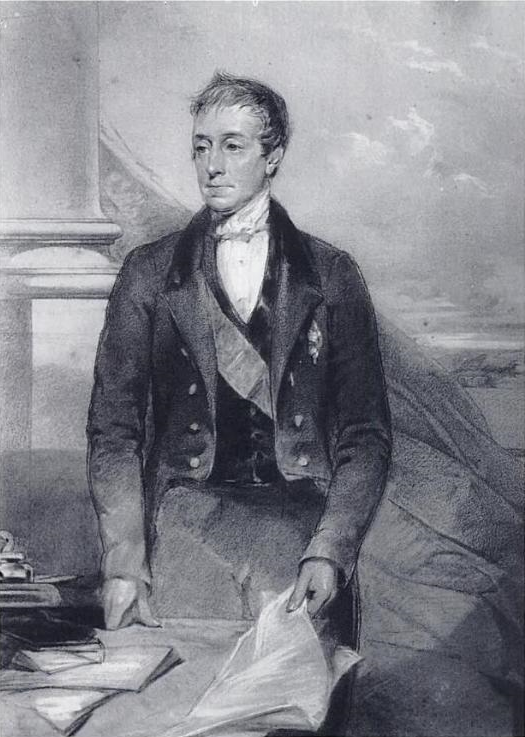 Auckland seems to have been quite a competent administrator, expanding the use of Hindi in administration and promoting education and irrigation projects, but unfortunately for him that’s not what he is remembered for. Rather, he has the distinction of being the first westerner since Alexander the Great to decide that Afghanistan was a great place for military adventurism. This ends about as well as you might expect. The conversation peters out and Flashman is about to leave, when chance intervenes. quote:I had been sitting with my lance at rest, the point six feet above my head, and some of the pi-dog’s blood dribbled down onto my hand; I gave an exclamation of disgust, and turning to Iqbal, who was sitting silently behind, I said: I did my BA at one of the colleges of the University of London called SOAS, which is an acronym for "The School of Oriental and African Studies"; it was set up in 1916 to teach foreign languages to Imperial administrators. It says something about the attitude to foreigners in the UK that it took about 150 years of ruling other people's countries before it became standard practice to learn their language before going. In any case, Crawford's attitude here is fairly typical of British expatriates. The impromptu display of linguistics gets Flashman an invitation to the Governor-General’s amazing palace, where he sets about charming Lord Auckland and his sister Emily. quote:When [Lady Emily] discovered I was only nineteen years old she nodded sadly, and spoke of the fair young shoots on the tree of empire. At last, Flashman has his chance. Although he is enjoying being a young man in a privileged position in India, as far as his nineteen-year-old self is concerned, his situation is awful: he’s in an out-of-the-way commission in an East India Company regiment, surrounded by fellow soldiers who are mercenaries or natives, with very little opportunity to impress Quality (that is, the nobility and gentry). So he decides to turn on his bluff heroic soldier act, in the hope that it will result in a comfortable staff posting with the Governor-General. The act goes down very well. quote:This morning I had been any old subaltern, and here I was hearing compliments from a Governor-General, and General, and the First Lady of India – foolish old trot though she was. You’re made, Flashy, I thought; it’s the staff for you, and Auckland’s next words seemed to bear out my hopes. In fact, it goes down a little too well. quote:“You’ll be more thankful yet when you know where Elphinstone’s service’ll take you,” says he, grinning. “By gad, I wish I was your age and had the same chance. It’s a Company army mostly, of course, and a damned good one, but it took ‘em a few years of service – as it would have taken you – to get where they wanted to be.” Well, poo poo.
|
|
|
|
|
Beefeater1980 posted:I’ll be bowdlerising that particular racial slur from future instalments – it’s Flashman’s default term for Indian people in this book so it gets a fair amount of screen time, unfortunately. What year is this installment supposed to be set in? My understanding was that that particular slur wasn't usually applied by the British to Indian people generally until after the Rebellion of 1857. e: Granted, my source on that is the writings of Jan Morris, who often takes a more rose-colored view of the Victorian empire than anyone should be comfortable with.
|
|
|
|
1994 Toyota Celica posted:What year is this installment supposed to be set in? My understanding was that that particular slur wasn't usually applied by the British to Indian people generally until after the Rebellion of 1857. The instalment is set in 1839-42, but the conceit is that Flashman is writing these in his retirement in the late 19th/early 20th century. Although 1839 is well into the hardening of racial attitudes that occurred among the British in the run up to the Rebellion. And yeah, Jan Morris is not a good source.
|
|
|
|
1994 Toyota Celica posted:What year is this installment supposed to be set in? My understanding was that that particular slur wasn't usually applied by the British to Indian people generally until after the Rebellion of 1857. At this point, it should be 1842, IIRC.
|
|
|
|
Edit: see next post. It's 1840, and the war is over (as far as the British are concerned) and just about to get hot again (as far as the Afghans are). Beefeater1980 fucked around with this message at 09:44 on Aug 11, 2019 |
|
|
|
Flashman is just about aware enough to know now what he’s in for. quote:The old fool actually thought I must be delighted at this news, and of course I had to pretend to be. I suppose any young officer in India would have jumped at the opportunity, and I did my best to look gratified and eager, but I could have knocked the grinning idiot down, I was so angry. I had thought I was doing so well, what with my sudden introduction to the exalted of the land, and all it had won me was a posting to the hottest, hardest, most dangerous place in the world. He handles this with his customary restraint. quote:That night I gave Fetnab the soundest thrashing of her pampered life and broke a pot over the sweeper’s head. Flashman is going to be serving under this man: General William George Keith Elphinstone, known informally as Elphy Bey (Lord Elphy; ‘Bey’ is a Turkish noble rank meaning ‘Chieftain’ or ‘Leader’). Elphy Bey made his name as a commander at Waterloo, when he was already in his thirties. At the time of his posting to Afghanistan he appears not to have had any actual wartime command experience for thirty two years; and he seems to have been trying to run down time and collect his pension in Bengal, protesting when he was sent to Afghanistan that he was “Unfit for it, done up body and mind”. So he and Flashman, at least, are about equally enthusiastic. One of the joys of Fraser’s writing is his short, savage character sketches; Flashman’s cynical voice lends itself very well to entertaining nastiness. Here he is on Elphy: quote:General Elphinstone (or Elphy Bey, as the wags called him) received me next day, and turned out to be an elderly, fussy man with a brown wrinkled face and heavy white whiskers; he was kind enough; in a doddering way, and as unlikely a commander of armies as you could imagine, being nearly sixty, and none too well either. Flashman sets about the practical business of getting ready for Afghanistan. He is to be sent off to Kabul in advance of Elphinstone’s arrival, as Elphy Bey is being sent to take over command of the Kabul garrison from general Willoughby Cotton. This gives us a better sense of the timing; we are now in late 1840/early 1841. Which leads to another brief historical interlude! 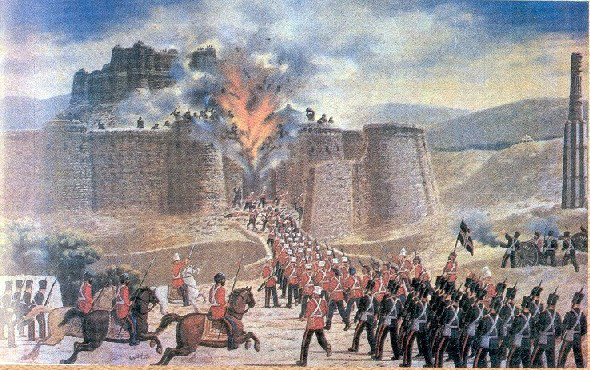 In 1840, as far as the British are concerned, the First Anglo-Afghan war is actually over. In 1839 the British got involved in a succession dispute between two claimants to the Afghan throne; emir Dost Mohammed and emir Shah Shujah. The background to all this is that Britain is concerned about two forces on the Northwest Frontier of India; Russia, which was assumed to be planning to invade India from the north, and the Sikh Empire, which had a very powerful military that had been extensively trained by the French, who never missed an opportunity to screw around with the British. Afghanistan is at the intersection of all of these. Dost Mohammed wanted to ally with the British so that he could get their support for helping him to recover the large city of Peshawar from the Sikh Empire, which had recently conquered it. The Brits, however, were not keen; the last thing they wanted to do was get into a war with the Sikh Empire because there was a good chance that they would lose it. Dost Mohammed responded by inviting a prominent Russian ambassador to his court in the hopes of getting more leverage in negotiating with Britain. Unfortunately, this caused the British diplomatic machine to go absolutely apeshit, and the political officers in the region started advising Calcutta that Dost Mohammed was in Russia’s pocket. This leads to one of those undiplomatic ‘diplomatic’ messages that start cropping up all throughout the 19th century, from the Governor-General of India to Dost Mohammed: Lord Auckland, A Very Smart Person posted:"You must desist from all correspondence with Russia. You must never receive agents from them, or have aught to do with them without our sanction; you must dismiss Captain Viktevitch with courtesy; you must surrender all claims to Peshawar.” The further history of this is absolutely amazing, and worth a quick read if you have time – it involved among other things an adventurer from Chester County, Pennsylvania who was trying to make himself a local king as representative for Dost Mohammed to negotiate with Britain – but in short, negotiations failed, and Britain invaded. This was no mean feat – Kabul was protected by a powerful fortress at Ghazni, pictured above being stormed – but by August 1839, it was in British hands. The British installed Shah Shujah as a puppet on the grounds that he was the rightful emir and “popular throughout Afghanistan”, neither of which was remotely true. The Duke of Wellington, who was still knocking around at this point in the House of Lords and who knew India well, showed remarkable prescience by calling the invasion “stupid” on the grounds that the British troops would easily conquer the place but then find it hard to hold a land of “rocks, sands, deserts, ice and snow.” So back to the present: the Afghan war has been over for a few months, and the British are installed in Kabul; it seemed sufficiently safe that the wives and families of the soldiers were moved up to Kabul to live with them, and a washed-up old timeserver like Elphy can be sent to manage the garrison. Flashman, however, has an exceptionally sharp sense of self-preservation, and sees things somewhat differently from the Anglo-Indian elite. quote:Before we started out, I got hold of as much information as I could about matters in Afghanistan. They seemed to stand damned riskily to me, and there were others in Calcutta – but not Auckland, who was an rear end – who shared this view. The reason we had sent an expedition to Kabul, which is in the very heart of some of the worst country in the world, was that we were afraid of Russia. Afghanistan was a buffer, if you like, between India and the Turkestan territory which Russia largely influenced, and the Russians were forever meddling in Afghan affairs, in the hope of expanding southwards and perhaps seizing India itself. So Afghanistan mattered very much to us, and thanks to that conceited Scotch buffoon Burnes the British Government had invaded the country, if you please, and put our puppet king, Shah Sujah, on the throne in Kabul, in place of old Dost Mohammed, who was suspected of Russian sympathies. Burnes is one of the two main British diplomats / political officers in Afghanistan. We’ll meet him later. quote:I believe, from all I saw and heard, that if Dost Mohammed had Russian sympathies it was because we drove him to them by our stupid policy; at any rate, the Kabul expedition succeeded in setting Sujah on the throne, and old Dost was politely locked up in India. So far, so good, but the Afghans didn’t like Sujah at all, and we had to leave an army in Kabul to keep him on his throne. This was the army that Elphy Bey was to command. It was a good enough army, part Queen’s troops, part Company’s, with British regiments as well as native ones, but it was having its work cut out trying to keep the tribes in order, for apart from Dost’s supporters there were scores of little petty chiefs and tyrants who lost no opportunity of causing trouble in the unsettled times, and the usual Afghan pastimes of blood-feud, robbery and murder-for-fun were going ahead full steam…the wise ones said that there was an explosion coming, and as we started out on our journey from Calcutta my foremost thought was that whoever got blown up, it should not be me. So off he goes, with Fetnab, Iqbal (the tough, competent Rissaldar whom he had been travelling with earlier) and his staff in tow, to his rendezvous with destiny.
|
|
|
|
|
Nice run through so far, very interested to keep following along!
|
|
|
|
Beefeater1980 posted:Iqbal (the tough, competent Rissaldar whom he had been travelling with earlier) A Quick Note on Indian Ranks, in case it should become relevant later: Indian soldiers in British service, often collectively known as "sepoys" after the lowest rank, have their own names for ranks which map directly onto the British structure. Sepoy: Private Naik: Corporal Havildar: Sergeant As in the British army, there are then various senior sergeants cutting about the place, cultivating their facial hair and doing a lot of shouting. The cavalry has its own names, again through British influence: Sowar: Trooper Lance-Daffadar: [RANT ABOUT IDIOTIC SNOBBISH BRITISH CAVALRY NCO TITLES EXCISED] Equivalent to Naik Daffadar: [SIMILAR RANT EQUALLY EXCISED] Equivalent to Havildar The Indian army also had odd things called Viceroy's Commissioned Officers, who in matters of politeness were treated almost as officers, and in matters of soldiering were rather more like a British sergeant-major, in that they were people of long service and high intelligence who were nevertheless outranked by the most junior of idiot second lieutenants (such as Flashman). The purpose of the VCO was to have someone with a brain in his head who could speak both English and his men's language; and so represent his men to the white officer, and give the men orders on behalf of the officer. (IIRC it did not become mandatory for officers on Imperial service to make any attempt to learn a useful language until the 1930s.) Both infantry and cavalry have Jemadars; the infantry has Subedars, and Subedars-Major; the cavalry has Rissaldars instead, because [FURTHER EXCISION DEEMED NECESSARY]. A sensible young officer in India would take frequent advice from his rissaldar and listen to much of what he was told. Let's see what Flashy does, shall we?
|
|
|
|
I'm really enjoying this so far, never heard of this book or this character, but so far this book feels so very familiar to Joe Abercrombie's first law books (fantasy series), there is such a strong feeling of familiarity, especially in the army-related chapters of the books and what I am reading here. And even one character seems to be a really good fit for Flashman himself (Jezal).
|
|
|
Trin Tragula posted:A Quick Note on Indian Ranks, in case it should become relevant later: This is super interesting, thanks dude. His Divine Shadow posted:I'm really enjoying this so far, never heard of this book or this character, but so far this book feels so very familiar to Joe Abercrombie's first law books (fantasy series), there is such a strong feeling of familiarity, especially in the army-related chapters of the books and what I am reading here. And even one character seems to be a really good fit for Flashman himself (Jezal). I'd be amazed if Abercrombie hadn't read Flashman; the books are very popular in the UK. Jezal has a lot of Flashy in his character; he's more or less equally awful but not as cunning or as cynical.
|
|
|
|
|
Jezal's more sympathetic than flashman imo once all his friends are dead and he realizes hes completely trapped in the machinations of a sociopath wizard who wont hesitate to ruin his life even harder if he thought he could get any thing out of it. That's kind of Abercrombie's shtick actually, characters that should be brutal and unsympathetic have really tragic backgrounds or are somehow fairly good natured despite being killers or whatever. It's only wizards that are unrepentant evil
|
|
|
|
For the most part, Fraser is a workmanlike writer, but there are a few areas in which he shines. I mentioned his character sketches already; another is his ability to bring the reader right into the middle of a scene with just a few short sentences. This should perhaps not be surprising. Apart from the Flashman books, George MacDonald Fraser also wrote screenplays for a number of swashbuckling adventure movies, including The Three Musketeers, The Four Musketeers and Force 10 From Navarone; he was also part of the writing pool for Bond movie Octopussy and swords-and-sorcery barbarian epic Red Sonja. Here is how he describes the journey to Afghanistan: quote:
I love that first paragraph for how it draws you in to the scene; you can almost feel the heat and the dust and hear the flies buzzing around your head. The man Flashman meets is this amazing fellow:  General Paolo Crescenzo Martino Avitabile was an Italian peasant who turned a stint in the milita of Naples into a series of senior military and civilian jobs for the Persians and the Sikh Empire. He remains one of the few Europeans to have done very well out of his time in that part of the world, ultimately retiring back to Italy where he got a knighthood and a European generalship out of his experience, as well as cleverly getting his money back to Europe without needing to make the journey guarding it by lending it to the British Army when they came through and then recovering it with interest from the British government back in Europe. His approach to civil governance in Peshawar was…well, according to the Wikipedia article small children are still told to behave themselves or ‘Abu Tabela’ will come and get them: Avitabile, showing the Ferguson Police how it’s done posted:“When I marched into Peshawar, I sent on in advance a number of wooden posts which my men erected around the walls of the city. The men scoffed at them and laughed at the madness of the feringhee [a disparaging local language term for Westerners], and harder still when my men came in and laid coils of rope at the foot of the posts...However, when my preparations were completed and they found one fine morning danging from these posts, fifty of the worse characters in Peshawar, they thought different. And I repeated the exhibition every day till I had made a scarcity of brigands and murderers. Then I had to deal with the liars and tale bearers. My method with them was to cut out their tongues. When a surgeon appeared and professed to be able to restore their speech, I sent for him and cut out his tongue also. After that there was peace” I mean, yes, I imagine it did have the effect of shutting people up if they thought they were going to get their tongues ripped out. Unsurprisingly, Avitabile likes Flashman enormously and they get roaring drunk together, feasting, singing and drinking late into the night. Avitabile explains how he keeps order through fear, and suddenly turns serious. Avitabile, late night party monster posted:“Boy, I think you are another like me, at heart: a condotierri, a rascal. Maybe with a little honour, a little courage, I don’t know. But, see now, you are going beyond the Khyber, and some day soon the Gilzais and others will be afraid no longer. Against that day, get a swift horse and some Afghans you can trust – there are some, like the Kuzzilbashis – and if the day comes, don’t wait to die on the field of honour.” He said it without a sneer. “Heroes draw no higher wages than the others, boy. Sleep well.” Then it’s onto the road again, with another of those wonderfully evocative descriptions: quote:In the morning we rode north, into one of the world’s awful places – the great pass of the Khyber, where the track twists among the sun-scorched cliffs and the peaks seem to crouch in ambush for the traveller. There was some traffic on the road, but most of those we saw were Afghan hillmen, rangy warriors in skull caps or turbans and long coast, with immensely long rifles, called jezzails, at their shoulders, and the Khyber knife (which is like a pointed cleaver) in their belts. Iqbal cheers up now that he’s back home in the hills, and starts teaching Flashman Pushtu, which is a source of great amusement to the Afghans they pass on the way. They eventually make it to Kabul, and again we get a lovely visualisation: quote:I saw the great fortress of Bala Hissar lowering over the city, and beyond it to the right neat lines of the cantonment beside the water’s edge, where the red tunics showed like tiny dolls in the distance and the sound of a bugle came faintly over the river. It was very pretty in the summer’s evening, with the orchards and gardens before us, and the squalor of Kabul Town hidden behind the Bala Hissar. Aye, it was pretty then. Next up: time to meet the leadership team!
|
|
|
|
|
Jezzails, incidentally, being long muzzle loading rifles, continued to be used in Afghanistan right up until the Soviet invasion of the country in the 1980s (!). Dr Watson of Sherlock Holmes fame was invalided out of the British Army after being shot by one in 1880.
feedmegin fucked around with this message at 21:34 on Aug 12, 2019 |
|
|
|
I liked this so much I decided to get it as an audiobook.
|
|
|
|
do the audiobooks replace the n-word with milder or more archaic slurs
|
|
|
|
Nope, it's very much on the nose and the narrator seems to take perverse joy from it. The first book is actually on youtube (or was when I listened it)
|
|
|
|
There are a couple different narrators and they seem to all do a good job of getting in Flashman's character. Which includes being utterly pathetic when he's afraid. Highly recommend the audiobooks for long drives.
|
|
|
|
Oh man David Case is amazing for these books. The way he delivers the racial slurs, along with pretty much all of the other lovely things that Flashman thinks and says about other people, is with such disregard that it doesn't even feel bad to me. It's just pure dismissal/distain rather than hatred.
|
|
|
|
I read ahead and finished the first book and the n bombs dont really bug me, they're in character. And not to spoil it, but, well, the superior attitude gets dropped eventually
|
|
|
His Divine Shadow posted:I liked this so much I decided to get it as an audiobook. I'm deliberately not re-reading so I can follow along as it gets posted!
|
|
|
|
|
Same. It's a hell of a temptation, as the story is only now really getting started. But the historic context and background is very well done. I appreciate it very much Beefeater1980. Also, I want to pick up something you mentioned earlier about Flashman having some surprising sparks of intelligence. I think Flashman isn't so much stupid as he is lazy and careless. I notice this more in the beginning of the stories when he makes some tremendously boneheaded mistakes. They come from him only putting effort into anything that would help him have fun or give him some kind of advantage. He just doesn't think unless he wants to. And soon enough, we'll see him apply his intellect to another subject he's very interested in; saving his sad, sorry skin. Even then, it seems to me that he's always taking the easiest way out. Overall, I think laziness is Flashman's most overlooked vice. It probably comes from this being an adventure series. There's not much room to show that sort of thing.
|
|
|
|

|
| # ? Apr 20, 2024 02:35 |
|
The Rat posted:There are a couple different narrators and they seem to all do a good job of getting in Flashman's character. Which includes being utterly pathetic when he's afraid. Highly recommend the audiobooks for long drives. Possibly not with (unprepared) company given the n-bombs, though (!)
|
|
|






